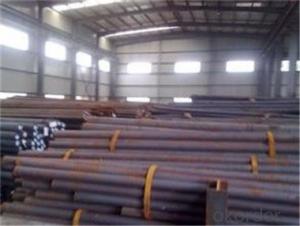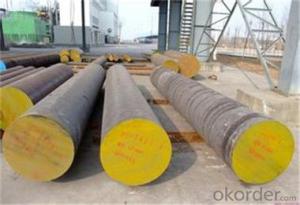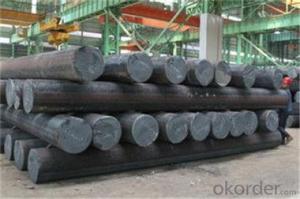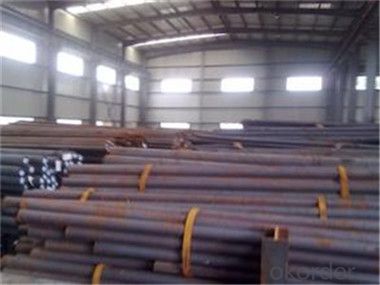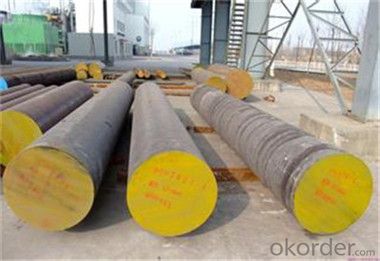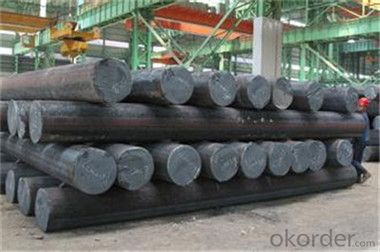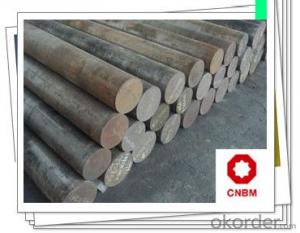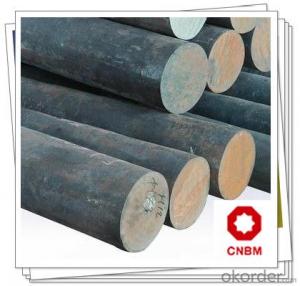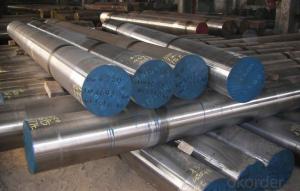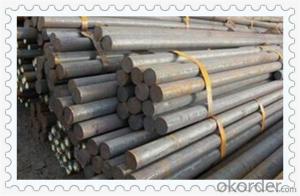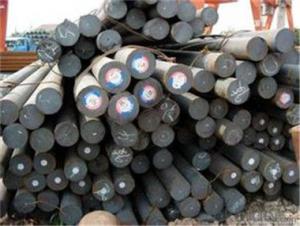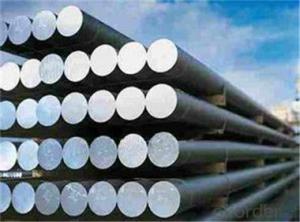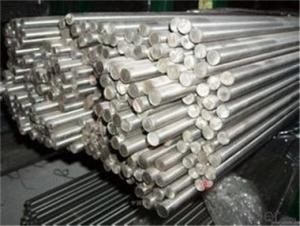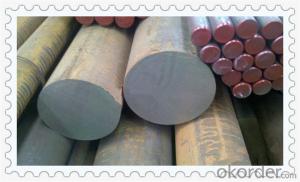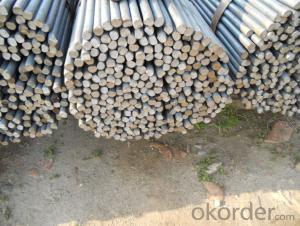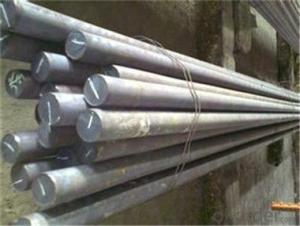High Quality Cheaper SAE1018 Steel Round Bars in China
- Loading Port:
- Tianjin
- Payment Terms:
- TT OR LC
- Min Order Qty:
- 554 m.t.
- Supply Capability:
- 20000333 m.t./month
OKorder Service Pledge
OKorder Financial Service
You Might Also Like
Description of steel round bar:
Carbon steelsdo rust easily, but they can be easily painted or primed. They are cheap so they are the normal choice for most fabrications. Mild Steel can be easily cut or drilled to meet your requests.is for making hot forming tools,hot forging dies,pressure casting tools,hot shear knives,tools for plastic industry,hot punches and dies for blanking,hot extrusion diesfor aluminium,tin and lead die casting.
Festures of steel round bar:
1.Dia 80-800mm Length:2000-13000mm or as required
2.Technique:Forged
3.Delivery Time:45 days
Specifications of steel round bar:
Grade | Chemical Contents % | ||||
C | Si | Mn | P | S | |
45 | 0.42~0.50 | 0.17~0.37 | 0.50~0.80 | ≤0.035 | ≤0.035 |
50 | 0.47~0.55 | 0.17~0.37 | 0.50~0.80 | ≤0.035 | ≤0.035 |
55 | 0.52~0.60 | 0.17~0.37 | 0.50~0.80 | ≤0.035 | |
Images of steel round bar:
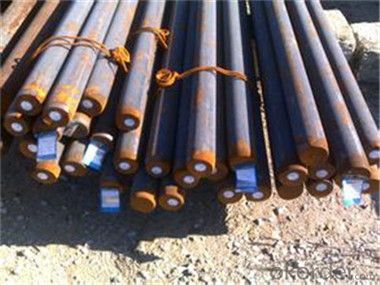
FAQ:
1. What is your package?
Packing situation: standard seaworthy packing or as customer required.
2. How long is the lead time?
Delivery time: 45 days after order confirmed.
3. What payment term do you accept?
Payment: T/T or L/C at sight.
- Q: How do you store steel round bars to prevent damage?
- To store steel round bars and prevent damage, there are several important steps to follow. Firstly, it is crucial to keep the bars in a dry and well-ventilated area to avoid moisture buildup, which can lead to rusting. Moisture can also cause the bars to become brittle and weaken over time. Next, it is advisable to store the round bars horizontally rather than vertically. This prevents warping or bending due to the weight of the bars pressing down on each other. If vertical storage is necessary, it is essential to use appropriate racks or supports that evenly distribute the weight. It is also important to avoid stacking the bars too high, as excessive weight can cause deformation or collapse. If stacking is unavoidable, ensure sturdy supports are used and the weight is evenly distributed across the stack. Additionally, it is advisable to separate different sizes or types of steel round bars to prevent scratching or damage. This can be achieved by using separators or dividers to create distinct compartments for each type of bar. Lastly, regularly inspect the stored round bars for any signs of rust, corrosion, or damage. If any issues are detected, take necessary measures to address them promptly. This may involve applying rust inhibitors, cleaning the bars, or contacting professionals for further assistance. By following these storage guidelines, you can effectively protect steel round bars from damage and ensure their longevity and quality.
- Q: How are steel round bars used in the mining industry?
- Steel round bars are widely used in the mining industry for a variety of applications. One of the most common uses is in the construction and reinforcement of underground support systems. These bars are often used as roof bolts or rock bolts to provide stability and prevent cave-ins or roof falls in underground mines. Steel round bars are also used in the manufacturing of drilling equipment. They are frequently used as drill rods or drill bits, providing the necessary strength and durability to withstand the harsh conditions of drilling in mining operations. These bars are typically heat-treated to increase their hardness and resistance to wear, ensuring their longevity in the drilling process. Another important application of steel round bars in mining is in the production of grinding media for grinding mills. These bars, known as grinding rods, are used to grind and crush ore particles in the milling process. They are made from high-quality steel and have a specific hardness and toughness to effectively break down the ore into smaller particles, facilitating the extraction of valuable minerals. Additionally, steel round bars are used in the construction of conveyor systems in mining operations. They are commonly used as support bars or rollers in conveyor belts, ensuring the efficient transport of mined materials from one location to another. In summary, steel round bars play a crucial role in the mining industry. From providing support and stability in underground mines to manufacturing drilling equipment and grinding media, these bars are essential in various mining processes, contributing to the overall efficiency and productivity of mining operations.
- Q: What is the difference between cast iron and round steel?
- Cast iron is composed of iron ore by crushing and grinding into powder, into the furnace after high temperature calcination into liquid (commonly known as iron) and then poured into the special mould after cooling into ingot is also called billet or iron, iron is the main component of alloy is composed of iron, carbon and silicon.
- Q: Can steel round bars be used in the manufacturing of kitchenware?
- Steel round bars have the potential to be utilized in the fabrication of kitchenware. Steel, being a long-lasting and adaptable substance, is frequently employed in the manufacturing of kitchen utensils and cookware. With the aid of shaping and molding techniques, steel round bars can be transformed into a wide range of kitchenware objects, including pots, pans, knives, spoons, and forks. The sturdiness and ability to withstand high temperatures make steel a perfect choice for cooking and food preparation. Furthermore, steel is uncomplicated to tidy, hygienic, and impervious to corrosion, rendering it an ideal material for kitchenware applications.
- Q: What is the minimum yield strength of steel round bars?
- The specific grade and type of steel being used can cause the minimum yield strength of steel round bars to vary. However, the majority of steel round bars generally possess a minimum yield strength of 36,000 psi (pounds per square inch) or 250 megapascals (MPa). This minimum yield strength ensures that the steel round bars are strong enough to resist applied loads and avoid deformation or failure. It is worth mentioning that certain applications may demand steel round bars with higher yield strengths to fulfill particular performance criteria.
- Q: How do steel round bars compare to glass round bars?
- Steel round bars are significantly stronger and more durable compared to glass round bars. Steel is a metallic material that offers high tensile strength and can withstand heavy loads, making it suitable for structural applications. On the other hand, glass round bars are more fragile and prone to breakage under stress. However, glass round bars have a more aesthetic appeal and are commonly used in decorative applications. The choice between steel and glass round bars depends on the specific requirements of the project, with steel being preferred for strength and glass for its visual qualities.
- Q: Are steel round bars used in the manufacturing of machinery?
- Yes, steel round bars are commonly used in the manufacturing of machinery. They are often utilized for various components such as shafts, gears, and axles due to their high strength, durability, and versatility.
- Q: Can steel round bars be used in the manufacturing of mining equipment?
- Mining equipment manufacturing often incorporates steel round bars due to their strength, durability, and versatility. These bars are commonly utilized in the construction industry, as their ability to be machined, welded, and fabricated into various shapes and sizes makes them the ideal choice for mining equipment. Components such as shafts, axles, gears, and structural supports in mining machinery can all be manufactured using steel round bars. Moreover, their ability to withstand heavy loads and harsh environments makes them the perfect fit for rugged mining conditions. Furthermore, heat treatment can be applied to steel round bars to enhance their mechanical properties, making them even more suitable for the manufacturing of mining equipment.
- Q: Can steel round bars be used for making electrical components?
- Whether steel round bars can be used for making certain electrical components depends on the specific requirements and applications. Steel is a versatile material that possesses good electrical conductivity and high durability, making it well-suited for a variety of electrical applications. However, when it comes to components that necessitate specific electrical properties or insulation, copper or aluminum may be more commonly utilized. Furthermore, in order to prevent corrosion or enhance electrical conductivity, it may be necessary to subject steel round bars to surface treatments or coatings. Ultimately, the appropriateness of utilizing steel round bars for manufacturing electrical components should be evaluated in accordance with the specific requirements and regulations of the intended application.
- Q: What is the difference between gcr12 round bar and Cr12 round bar? Can it be used in general?
- The chromium content of the two is very different, and the range of application is different.
Send your message to us
High Quality Cheaper SAE1018 Steel Round Bars in China
- Loading Port:
- Tianjin
- Payment Terms:
- TT OR LC
- Min Order Qty:
- 554 m.t.
- Supply Capability:
- 20000333 m.t./month
OKorder Service Pledge
OKorder Financial Service
Similar products
Hot products
Hot Searches
Related keywords
